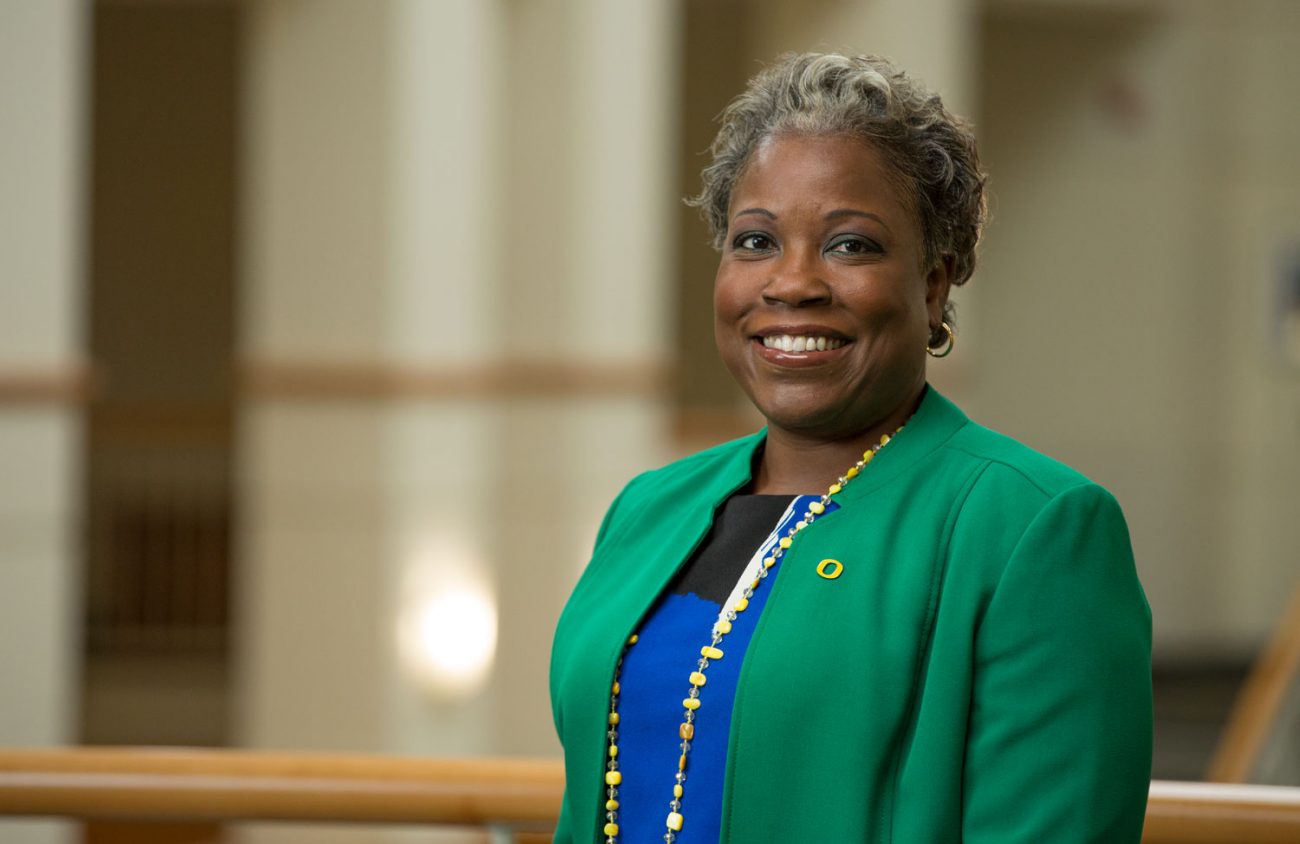When she’s not busy being a lawyer and administrator, Marcilynn Burke’s favorite pastime is singing in a church choir. While she’s also a fine soloist, Burke prefers to hear her mellow alto blend in easily with the voices of other singers around her.
“I am definitely the best choir member you’ll ever meet,” she says.
That’s also the approach she has often used with her legal work throughout a career that’s taken her from a Southern hometown to working as a top administrator at the federal Bureau of Land Management and serving as acting assistant secretary for land and minerals management in the Obama administration’s Interior Department.
Formerly on the faculty at the University of Houston Law Center, Burke last summer took over as dean of the University of Oregon School of Law — drawn here, she says, by the school’s environmental and natural resources law program along with its overall reputation as a law school.
Burke got her bachelor’s degree in international studies at the University of North Carolina in Chapel Hill in 1991 and her law degree at Yale University in 1995. There she was editor of both the Yale Journal of International Law and the Yale Journal of Law and Feminism.
Since then she has worked in environmental and land use law during the era of the Sagebrush Rebellion, in which states have tried to take over federal public lands in the West; the original 2014 Bundy standoff in Bunkerville, Nevada; and the more-recent attempt in 2016 by the Bundy family and its armed followers to seize control of the Malheur National Wildlife Refuge south of Burns.
She worked at the BLM and Interior Department during the lead-up to the 2014 standoff in Bunkerville, in which heavily armed supporters of the family prevented federal employees from seizing cattle that had been grazing on public land without the payment of grazing fees. In the end, the government backed off.
“We needed to do more work,” she says of the standoff. “We had a court order that [Bundy] was in trespass. But it was an old order.”
The government also needed to work more closely with the local sheriff and with state authorities, she says.
In the end, that conciliatory approach failed, she admits. “We did all that work. It still turned into a disaster,” Burke says. “I didn’t anticipate the number of people who would turn out to support the Bundys. The family owed almost a million dollars in grazing fees to you and me, the taxpayers.”
Burke is not exactly a populist on land-use matters. In 2009, she published a paper titled “The Emperor’s New Clothes: Exposing the Failures of Regulating Land Use through the Ballot Box” in the Notre Dame Law Review.
“My concern was that land-use issues — you can take Malheur refuge as an example — are very complicated and complex,” she says. “They don’t seem to be appropriate for yes/no decision making.”
But then, like the good lawyer she is, Burke qualifies that statement. Actually, she says, a yes/no decision ultimately does have to be made — sometimes even at the ballot box — but that decision should culminate a longer-term process of examining goals and presenting alternatives, so that the final decision is well informed.
“But you can’t expect voters to research every single ballot initiative.”
Burke got the idea of becoming a lawyer from watching Perry Mason on television as a child growing up in Raleigh, N.C., the daughter of two public school educators.
“I liked what I saw,” she says. “Even knowing now that television wasn’t a very realistic depiction of law. It was that sense of righting wrongs, the idea that I could bring my skills to bear to help people.”
Burke, an African-American, will oversee a law school community that was deeply divided last year when a white law professor dressed herself in blackface for a Halloween party at her own home to which law school students were invited.
The professor later said she was trying to make a point about racism; some at the law school called for her to be fired.
“‘Unfortunate’ is probably as good a word as any to describe it,” Burke says. “I am sorry the law school community had to go through the experience that it did. Some people feel that not enough was done. Some say too much was done.”
Burke is looking forward rather than back. “How do we make sure the law school is a place where people are free to express themselves, and where people still feel respected?” she says.
At the law school, Burke says she’s still in the “listening and learning phase of my deanship,” talking with people, taking the pulse of the community.
At this point, you might say, she’s still singing in the choir. Any minute, though, you can expect her to step forward and sing solo.
